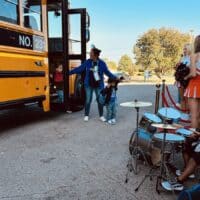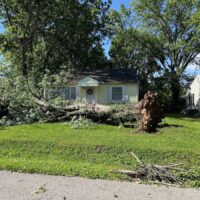A controversial bill that would mandate a process in all of Kentucky’s 171 public school districts for parents to challenge materials, programs or events they consider “harmful to minors” received a House committee’s approval Monday in a party-line vote.
Sen. Jason Howell, R-Murray, the primary sponsor of Senate Bill 5, said before the House Education Committee that he’s received criticism from both sides of the political spectrum on the legislation, which means he “got it close to right” on crafting the bill.

Echoing previous comments of his, Howell said the bill lets school boards define what materials, programs or events are “harmful” to students.
“The best part about it is I don’t really have to define it, because we leave that evaluation to … the principals first and then the local school boards to decide what is over the line on these issues or not as they see fit with their communities,” Howell said.
The bill defines “harmful to minors” as:
- (a) Contains the exposure, in an obscene manner, of the unclothed or apparently unclothed human male or female genitals, pubic area, or buttocks or the female breast, or visual depictions of sexual acts or simulations of sexual acts, or explicit written descriptions of sexual acts;
- (b) Taken as a whole, appeals to the prurient interest in sex; or
- (c) Is patently offensive to prevailing standards regarding what is suitable material for minors.
Parents or guardians of students would have to submit a complaint in writing to a school principal, who would have ten business days to determine if such a complaint met the definition of “harmful to minors” and meet with said parent or guardian about if such material, program or event would remain or be restricted or removed.
If a parent or guardian didn’t like the decision by the principal, they could appeal to the school board, which would be required to hold a public hearing about the matter within at least 30 calendar days. The decision and individual vote of the board on whether to restrict or remove the material, program or event would be published in the largest local newspaper.
“There’s a lot of votes that we take as school board members that aren’t that popular,” said Howell, who is also a former Murray Indpendent Schools board member. “We felt that on issues that were this intimate and this involved with the children that we thought that was the best process.”
A parent or guardian can request in writing that a material, program or event be restricted from their student if the school board decides to allow for the material, program or event to remain.
“In a tizzy about some ‘dirty’ books”
Representatives on both sides of the aisle offered their support or concerns about the bill, with Democrats particularly concerned about further burdening overworked principals or the legislation having a “chilling effect” on parent-teacher relationships.
Rep. Josie Raymond, D-Louisville, asked Howell before she voted “no” on the bill if he could name examples of programs or events in the past year or two that have outraged parents, saying that “everybody’s in a tizzy about some ‘dirty’ books.”
Howell, without naming specific examples, said there were “certain programs and events” that have generated a lot of discussion. Senate President Robert Stivers, who sat next to Howell, said there was an incident in “his own backyard” involving “twerking” with a school administrator but didn’t say where the incident was.
Rep. Lisa Willner, D-Louisville, said she was “really struck” that the inspiration for the bill wasn’t coming from a “real incident” at the local level.
“This seems to be a part of a national conversation that, you know, has been divisive,” Willner said. “That concerns me that, again, we’re sort of putting our schools, our public schools as the front line of battle of these larger political culture wars.”
Republicans on the committee took aim in their comments at what they believed was pornographic or sexual content in schools, with one mentioning the book “Genderqueer: A Memoir.”
The graphic novel by author Maia Kobabe, who is nonbinary, has been a frequent target of Republican-controlled legislatures as they’ve pushed “parental rights bills” the past two years. The illustrated novel deals with gender identity and sexuality.
Miranda Stovall, a part of a conservative organization called No Left Turn in Education, provided committee members with packets containing pictures from books including “Genderqueer: A Memoir,” the graphic novel “Blankets” and “All Boys Aren’t Blue.” Stovall unsuccessfully tried to remove “Genderqueer: A Memoir” from libraries in Jefferson County Public Schools.
“We’re trying to protect children from seeing books like ‘Genderqueer’ that depicts sexual acts, and that the entire Jefferson County school board has denied people like Miss Miranda Stovall the ability to remove,” said Rep. Josh Calloway, R-Irvington.
The Lantern reported earlier this month Howell said his Twitter account was hacked after multiple tweets containing pornography or sexual references were “liked” by his account. A spokesperson for Senate Republicans said his Twitter account activity was “unrelated” to his sponsorship of Senate Bill 5, and Howell said in a statement that his efforts remained “unfettered” to pass the legislation.
Stovall and a few others testified in support of the bill including Mirna Eads, whose group succeed in getting three books removed from school libraries in Northern Kentucky earlier this year.
Several people testified against the legislation, some of them worried that the language in the bill could be applied too broadly by some school boards. Brenda Rosen, executive director of the Kentucky Chapter of the National Association of Social Workers, said she worried about the mental struggles of LGBTQ youth who might need books that validate their existence.
“What about the child that needs that book. That book might be something that helps to sustain, to support, to engage, educate and empower,” Rosen said. “I totally understand some parents speaking up and being outraged about different books. But let’s be honest: kids have phones.”
“We’ve got to come together, and banning books is not the way.”
This article is republished under a Creative Commons license from Kentucky Lantern, which is part of States Newsroom, a network of news bureaus supported by grants and a coalition of donors as a 501c(3) public charity. Kentucky Lantern maintains editorial independence. Contact Editor Jamie Lucke for questions: info@kentuckylantern.com. Follow Kentucky Lantern on Facebook and Twitter.
Liam Niemeyer covers government and policy in Kentucky and its impacts throughout the Commonwealth for the Kentucky Lantern. He most recently spent four years reporting award-winning stories for WKMS Public Radio in Murray.






